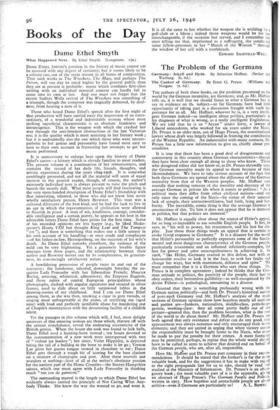The Problem of the Germans
Germany: Jekyll and Hyde. By Sebastian Haffner. (Seeker and Warburg. 8s. 6d.)
THE authors of both these books, on the problem presented to the world by the German mentality, are Germans; and, as Mr. Haffner tells us, it is well that we should listen to what a German has to say in evidence on thc subject—so far Germans have had little opportunity of taking part in a discussion fraught with such im- portance for us all. Mr. Haffner, whoever he is, is a very intelli- gent German indeed—as intelligent about politics, particularly in his diagnosis of what is wrong, as a really intelligent Englishman. We are told that he is an " Aryan " under forty, a lawyer of Liberal antecedents who worked for six years under the Nazis. Dr. Preuss is an older man, son of Hugo Preuss, the constitutional lawyer whose draft was largely followed in framing the constitution of the Weimar Republic. An industrialist with many contacts, Dr. Preuss has a little new information to give us, chiefly about per- sonalities.
It is true that there has been a good deal of disagreement and controversy in this country about German characteristics—though they have been clear enough all along to those who knew. Those who disagreed either did not know or, as Dr. Preuss shrewdly says, the German mentality made its appeal to them because of their likemindedness. We have to take serious account of the fact that both these Germans are agreed about the difference of the German mentality from that of the Western peoples. Mr. Haffner says roundly that nothing remains of the morality and decency of the average German in private life when it comes to politics: "As a political mass they differ from other civilised nations—and not only since the coming of the Nazis—by virtue of their unusual lack of scruple, their untrustworthiness bad faith, lying and bar- barity. The incredible, comic thing is ;hat the average German is unconscious of this. To him it does not appear that he is immoral in politics, but that politics are immoral."
Mr. Haffner is equally dear about the source of Hitler's appeal, for so long so incredible to too sensible English people. It lies, he says, in "his will to power, his resentment, and his lust for dis- play. Just those three things made an appeal that is certain to evoke fervid response in Germany." It is a disaster for the world that Hitler's personality so perfectly expresses some of the funda- mental and most dangerous characteristics of the German people, particularly resentment and an inflamed inferiority-complex, the lust for power and utter unscrupulousness in achieving it. In 1918, "like Hitler, Germany reacted to this defeat, not with an honourable resolve to look it in the face, to seek her faults and change her ways' but with resentment, defiance and spite." We must remember that it is a German who says these things. Dr. Preuss is in complete agreement ; indeed he thinks that the Get- man attitude to politics, the passivity of the people, their lust to obey orders, their bottomless gullibility—so well-recognised by the divine Fiihrer—is pathological, amounting to a disease.
Granted that there is something profoundly wrong with the German nation politically—and both Dr. Preuss's historical survey of post-1918 Germany and Mr. Haffnees analysis of the main sections of German opinion show how hopeless nearly all sections and parties are—Junkers nationalists, middle-class, petit-bour- geoisie, working-class: ley all come pretty badly out of the picture—granted this then the problem becomes what is the rest of the world to do about them? Mr. Haffner and Dr. Preuss Ire both agreed that only resistance and defeat can do any good, that appeasement was always nonsense and only encouraged their worst elements; and they are united in urging that when victory comes the responsibility must be brought home to the Nazis, who must be made to pay the penalty for their crimes. A mere foreigner may be permitted, perhaps, to repine that the whole world should have to be called to arms to achieve that desired end on behalf of the German people, who are, after all, responsible.
Here Mr. Hafer and Dr. Preuss part company in their reconl- mendations. It should be stated that the formees is far the more valuable book, and for the suggestions it has to make with regard to the right propaganda line for us to take, should be-read iind studied at the Ministry of Information. Dr. Preuss's is an objur- gatory book the most valuable part of it is the appendix, givIng an abstract of Hugo Preuss's The German People and Polinch written in 1915. How hopeless and unteachable people are about politics—even if Germans are particularly so! A. L. ROWSE.






























 Previous page
Previous page